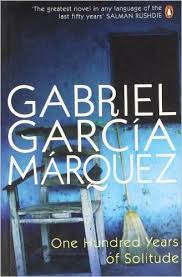Invocation : I read the novel for the first somewhere in 1996 when I was a carefree young man in Malabar. I have two qualification to write this “Revisit” – primary one being of love for this epic and secondary for being a translator for last twenty years with interruptions in the form of job, marriage, fatherhood, need to earn and other un-avoidable distractions.
I would also like to remind those writers in India (and elsewhere) who write fiction to ask themselves this question : Why did Marquez had to write in Spanish only ?
Because, he was not writing for any target audience in view, even if he would have wished to, the epic that consumed him and us in some strange brotherhood, would have erased all memories of everything except that infantile period of our existence when we learn our first language.
*********************************************************************
One of the greatest novels of last one hundred years, hush, now opening :
“Many years later, as he faced the firing squad, Colonel Aureliano Buendia was to remember that distant afternoon which his father took him to discover ice.”
After some 400 pages of epic journey, twisting space-time, pulverizing all known and unknown laws of matter and mind but remaining true to some strict Law of Narrative Art. The last surviving character of the Buendia family whose hundred year old history had just pushed us beyond history, of whose trend we heard from Melquades who knew Sanskrit among many other languages and wrote down the history in parchments in codes and the encryption, encrypted event and the conscious entity that decodes now all come in a singularity and we experience or half-experience what a black-hole singularity in literature is. Just before the black hole sucks us in, the poet who is only empowered to commands all the horizons, informs and then…
“Before reaching the final line, however, he had already understood that he would never leave that room, for it was foreseen that the city of mirrors (or mirages) would be wiped out by the wind and exiled from the memory of men at the precise moment when Aureliano Babilonia would finish deciphering the parchments, and everything written on them was un-repeatable since time immemorial and for ever more, because the races condemned for one hundred years of solitude did not have a second opportunity on earth.”
This is not possible to say what lies in between these two paragraphs – the start and the finis. Not because there are too many things or there are too many events and characters or too complex things happening – no, nothing of that sort. The in-between 400 pages is a charm and anyone who reads the “parchment” now becomes part of Aureliano Babilonia, and the charm takes hold and the control over memory goes away.

Only Melquades could resist the charm for he is the author and narrator in some way and at what cost : “He was a fugitive from all the plagues and catastrophes that had ever lashed mankind. He had survived pellagra in Persia, scurvy in Malayan archipelago, leprosy in Alexandria, beriberi in Japan, bubonic plague in Madagascar, an earthquake in Sicily and a disastrous shipwreck in the straits of Magellan.”
Only three works of literature save Cien Anos de Soledad evoked the same sense in me and they are : The Mahabharata, Great Expectations and The Godfather Trilogy. (the film)
I wanted to thank the epic for letting me discover new things inside me which I did not know. The novel remained as it is for last 40 years (published in Spanish for the first time in 1967, the greatest revelation in the language after Don Quixote as some critic has so blessedly told) and I changed but somehow the novel could bring out completely new things from my deep interior – an interior which neither a surgeon’s knife or a psycho-analyst can ever reach because these birds of memory, like Remedios the Beauty’s disappearance – something that reminds us of the last act of the Mahabharata when Emperor Yuddisthira stood at the peak of the Himalayas and a strange wind perhaps picked him up and wiped off the face of the earth.
I borrow the following lines from Bengal’s greatest poet – Rabindranath Tagore and since borrowings from the ocean to greet another ocean have no sense of debt or shame, I pay my respects to these greats Artists who are now perhaps dining together in some Dantean Heaven where we can never reach with our mortal frame except with the “viewless wings of poesy” :
উদার আশার বিষাদ মহান[ The great melancholy of expansive Hope;]
অসীম শান্তি করিতেছে দান চির-মানবের প্রাণে [ brings forth Eternal Peace for the Man Eternal.]
(কবির পুরষ্কার) [ Poet’s Reward ]
Recommendation : “Required reading for the entire human race” If some Bengali poet ever undertakes a translation of this work, I request him to consider the title as “শতবর্ষের নি:সঙ্গতা”

More lucidity, wit, wisdom, and poetry than is expected from 100 years of novelists.